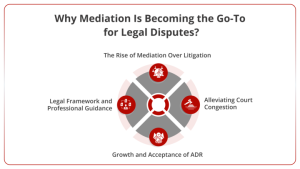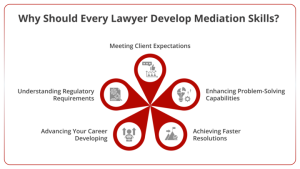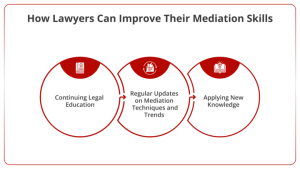Lawyers must continuously adapt new mediation practices and evolving client expectations, which can be as demanding as rewarding. One significant way you can stay ahead is by participating in events like Destination CLE Conferences. Organized across various global locations, these conferences allow lawyers to earn CLE credits while actively learning about new developments in law and strategies. However, the journey doesn’t come without challenges.
Why Mediation Is Becoming the Go-To for Legal Disputes?
As you’ve likely noticed, the scope of legal disputes is transforming. A significant shift from courtroom litigation to alternative dispute resolution (ADR) methods like mediation is underway. Let’s explore why mediation is increasingly preferred over litigation and how this shift impacts the legal field.
The Rise of Mediation Over Litigation
The legal community has seen a noticeable shift from litigation to mediation in recent years. Mediation has clear benefits, such as cost-effectiveness and time efficiency, drive this shift. Unlike the prolonged litigation process, mediation provides a platform for quicker resolution, which is less stressful and allows you and your clients to save on legal fees and other associated costs.
Alleviating Court Congestion
Mediation presents a practical solution by diverting cases that may not require judicial intervention. This speeds up the resolution process and reduces the strain on the court system, allowing it to focus resources on more contentious cases that necessitate judicial oversight.
Growth and Acceptance of ADR
Mediation has seen a surge in acceptance among legal professionals and clients as a core component of ADR. According to the American Bar Association, mediation and other ADR methods have become integral in civil and commercial disputes. This trend is supported by the increasing number of states incorporating mediation into their court procedures. For instance, states like California and New York have implemented mandatory mediation programs in certain civil disputes, showcasing the institutional acknowledgment of their efficacy.
Legal Framework and Professional Guidance
Understanding the legal framework that supports ADR in the U.S. is crucial. The Federal Arbitration Act (FAA) provides the legal basis for enforcing arbitration agreements and awards, indirectly supporting the broader ADR agenda, including mediation. Furthermore, many state and local court rules now integrate provisions that encourage or mandate mediation, particularly in family law, real estate, and small business disputes.
Mediation: A Strategic Tool for Effective Conflict Resolution
Mediation is a facilitated negotiation process in which a neutral third party, the mediator, helps disputing parties find a mutually acceptable solution.
The mediator does not decide the outcome but assists in understanding the issues and developing options. This contrasts sharply with arbitration, where the arbitrator acts similarly to a judge, making decisions that can be binding. Unlike litigation and arbitration, mediation is voluntary and collaborative, focusing on finding solutions for all parties involved.
Mediation is generally quicker and less costly, reducing clients’ financial strain. The process is confidential, ensuring that discussions, documents, and outcomes remain private, thus protecting reputations and sensitive information. Mediation also provides greater flexibility, allowing parties to negotiate solutions tailored to their needs, unlike the fixed outcomes in court cases.
Additionally, its collaborative nature helps preserve and sometimes even strengthen relationships between parties, making it especially valuable in disputes involving ongoing interactions, like business partners or family members.
Why Should Every Lawyer Develop Mediation Skills?
As a lawyer, here’s why developing these skills is becoming essential in today’s legal environment.
Meeting Client Expectations
Clients increasingly prefer not to engage in prolonged litigation due to its high costs and emotional toll. By mastering mediation, you can offer more cost-effective and amicable solutions. This meets client expectations and builds trust, as clients see you actively working to protect their interests efficiently and respectfully.
Enhancing Problem-Solving Capabilities
Mediation skills refine your ability to think outside the conventional adversarial legal framework. This involves creative thinking and a solution-oriented approach that can be beneficial even outside of mediation sessions. Whether negotiating a settlement or crafting a complex legal strategy, these skills can enhance your ability to find innovative solutions that satisfy all involved parties.
Achieving Faster Resolutions
With your expertise in mediation, you can guide clients through the resolution process more swiftly than litigation. This efficiency saves time and reduces legal fees and associated costs, making legal services more accessible to your clients and reducing the stress involved in legal disputes.
Advancing Your Career Developing
Mediation skills can distinguish you from a crowded field of legal professionals. They also open up new career opportunities within areas increasingly relying on ADR methods. These could include serving as a mediator, a consultant in ADR practices, or a legal advisor specializing in negotiation.
Understanding Regulatory Requirements
In many jurisdictions, having certain ADR credentials may be a prerequisite for handling specific cases. Moreover, ethical guidelines in the legal profession increasingly encourage the exploration of alternative dispute resolution methods before resorting to litigation.
Essential Mediation Skills for Modern Lawyers
Here’s a look at the core skills that can help you become a proficient mediator and make a real difference in your practice and for your clients.
Active Listening
Active listening is about fully comprehending all parties’ underlying concerns and emotions. This skill allows you to grasp a dispute’s legal and personal dimensions. As you listen, reflect on what you’ve heard to confirm your knowledge—this clarifies any ambiguities and reassures clients and opposing parties that their views are being considered.
Cultivating Empathy
Showing empathy involves acknowledging the feelings and perspectives of each party, which can transform the negotiation atmosphere from adversarial to cooperative. Empathy allows you to connect on a human level, which can be particularly powerful in breaking down barriers and finding common ground.
Neutrality and Impartiality
The cornerstone of effective mediation is the mediator’s ability to remain neutral. You must manage conflicting interests without personal bias or judgment. This impartial stance not only upholds the fairness of the mediation process but also reinforces all parties’ confidence in the proceedings’ neutrality.
Communication and Negotiation Skills
Effective communication is crucial in mediation. It involves articulating your client’s position clearly and persuasively without alienating the other side. Additionally, good negotiation skills require you to remain open to different perspectives while advocating for your client’s interests in a way that fosters collaboration rather than conflict.
Creativity in Problem-Solving
Unlike the more rigid frameworks of litigation, mediation allows for creative solutions. This not only leads to more sustainable resolutions but also often preserves or even strengthens relationships post-dispute.
The Role of Mediation in Different Legal Areas
| Legal Area | Role of Mediation | Benefits of Mediation |
| Commercial Disputes | Used to resolve conflicts related to business operations, contracts, partnerships, and other commercial matters. |
|
| Family Law | Applied in divorce, custody battles, and other family-related issues to facilitate amicable resolutions. |
|
| Employment Law | Addresses workplace issues like discrimination claims, wage disputes, and harassment allegations through confidential discussions. |
|
| Real Estate and Property Disputes | Utilized to resolve landlord-tenant conflicts, property damage claims, and disputes over property titles. |
|
| Personal Injury and Insurance Claims | It helps settle claims related to injuries and insurance disputes without going to court, often resulting in faster payouts. |
|
How Lawyers Can Improve Their Mediation Skills?
Continual professional development is essential for lawyers who want to enhance their mediation skills. Here’s how you can integrate continuous learning into your practice:
Continuing Legal Education
Continuing Legal Education (CLE) is essential for lawyers to maintain their professional skills and keep up with new legal developments. Destination CLEs provide an innovative way to meet these requirements by hosting conferences in various international locations, combining education with a change of scenery from the usual office or seminar settings.
Participating in Destination CLEs can be particularly beneficial for expanding your understanding of new developments in law. These conferences often feature sessions led by experienced mediators and include workshops or panels discussing the latest in mediation practice. The setting change can refresh your perspective and increase your engagement with the material.
Destination CLEs conferences provide unique networking opportunities with other legal professionals with similar interests in mediation. These can lead to building relationships with potential mentors or collaborators who can offer insights and advice as you develop your mediation practice.
Regular Updates on Mediation Techniques and Trends
Regularly reading industry publications, journals, and books on mediation can keep you informed about new techniques and theories. Online platforms, blogs, and forums dedicated to mediation are also valuable resources.
Many organizations offer webinars and online courses that focus on specific aspects of mediation, such as handling complex cases, dealing with high-conflict personalities, or ethical considerations in mediation. These resources are often updated to reflect current trends and challenges in the field.
Applying New Knowledge
Apply what you learn and reflect on the outcomes. This hands-on application is crucial for turning theoretical knowledge into practical skills. Seek feedback from peers and mentors on your mediation approach and techniques. Constructive criticism can guide your learning process and help you make adjustments to improve your effectiveness.
You can significantly enhance your skills and effectiveness as a mediator by continuously learning through innovative formats like Destination CLEs, staying current with mediation practices, and actively applying new knowledge. This ongoing commitment to improvement will benefit your professional growth and the quality of service you provide to your clients.
Blend Education with Adventure: Secure Your Spot at Destination CLEs!
Destination CLEs redefine the way legal professionals meet their continuing education requirements. Our conferences blend educational opportunities with cultural immersion in some of the world’s most captivating cities.
Why Choose Destination CLEs?
- Meet CLE Requirements: Fulfill your mandatory CLE credits through engaging, high-quality seminars in stunning global locations.
- Transformative Learning: Turn the usual lecture-based learning on its head by engaging in sessions as dynamic as the destinations.
- Networking Opportunities: Connect with peers worldwide, expanding your professional network in settings that encourage collaboration and growth.
- All-Inclusive Experience: Enjoy comprehensive packages that cover educational sessions, accommodations, and unique cultural experiences, making your learning adventure seamless and memorable.
- Efficient Credit Earning: Earn required CLE credits efficiently, with schedules that balance professional development and exploration.
Plan your next educational journey with Destination CLEs and ensure extraordinary professional development. Our 2024-2025 lineup includes diverse locales such as Puerto Vallarta, Dubai, Havana, and an Alaska Cruise—each offering a distinct blend of legal education and local culture.
Secure your spot today and become part of a community dedicated to professional growth and networking.
DestinationCLEs.com is a participant in the Amazon Services LLC Associates Program, an affiliate advertising program designed to provide a means for sites to earn advertising fees by advertising and linking to Amazon dot com.













